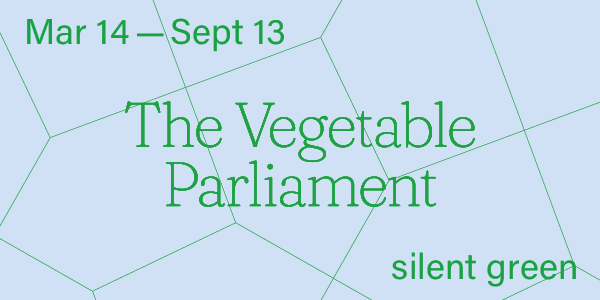by Juan José Santos Mateo // July 8, 2025
This article is part of our feature topic Water.
No swimming. Years—decades, centuries—of industrial runoff, pesticides, herbicides, fertilizers, detergents, oil and sewage have turned Kent’s coastal areas into a place fit only for…taking photos. The London-based collective Cooking Sections (Daniel Fernández Pascual and Alon Schwabe)—who often work at the intersection of art, architecture, ecology and geopolitics—come to the rescue.
This July, the ‘Ministry of Sewers’ will open as part of the Folkestone Triennial, curated by Sorcha Carey. The mission of Cooking Sections’ proposal is to address water pollution and advocate for a cleaner, swimmable coastline throughout the year. Located in Folkestone harbor, this public space and installation serves as a hub for listening, amplifying local voices, documenting grievances and driving collective action to address sewage mismanagement and agrochemical runoff. The Ministry of Sewers invites residents and visitors to book an appointment with the Minister and file their complaints and evidence of water mismanagement, mistreatment and missflows, which will all be collected into a so-called ‘Log of Grievances.’ Visitors to the Ministry can join the local petition to demand that parliament implement a policy for year-round water testing, while also filling out the Ministry’s questionnaire, developed with legal advisors and environmental lawyers to gather testimony that may support future legal cases or civic action. We spoke to Cooking Sections about what they hope to achieve with this work and how it forms a part of their wider research-based practice.
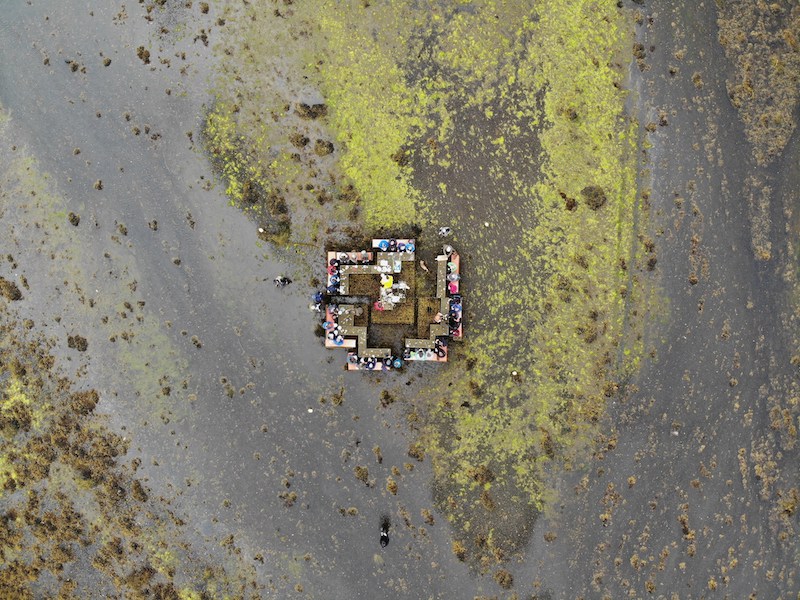
Cooking Sections: ‘On Tidal Zones,’ 2017 // Photo by Nick Middleton, courtesy of Atlas Arts, Alon Schwabe
Juan José Santos: How do you approach the concept of the sewer in this context?
Cooking Sections: The Ministry reclaims the original meaning of “sewer” as a vital ecological network. Long before privatization turned sewers into toxic pipelines, marsh sewers fed fields and linked freshwater springs, chalk aquifers, human bodies and coastal wetlands. Collective water governance was once the norm, formalized under the 1427 Statute of Sewers, which held Romney Marsh—just south of Folkestone—as England’s drainage model.
Today, deregulation, crumbling infrastructure and intensified storms have made raw sewage a permanent fixture along the coast. In 2023 alone, beaches across Folkestone, Hythe and Romney Marsh endured nearly 4,000 hours (around 166 full days) of sewage releases—forcing two beaches into permanent no-swim status and resulting in skin rashes, infections and financial losses from cancellations of holidays and water sport activities. It is in this context that the Ministry of Sewers invites residents, activists, birdwatchers, schoolchildren and scientists to share their experiences of restricted marine access, stream contamination and broader ecological disruption.
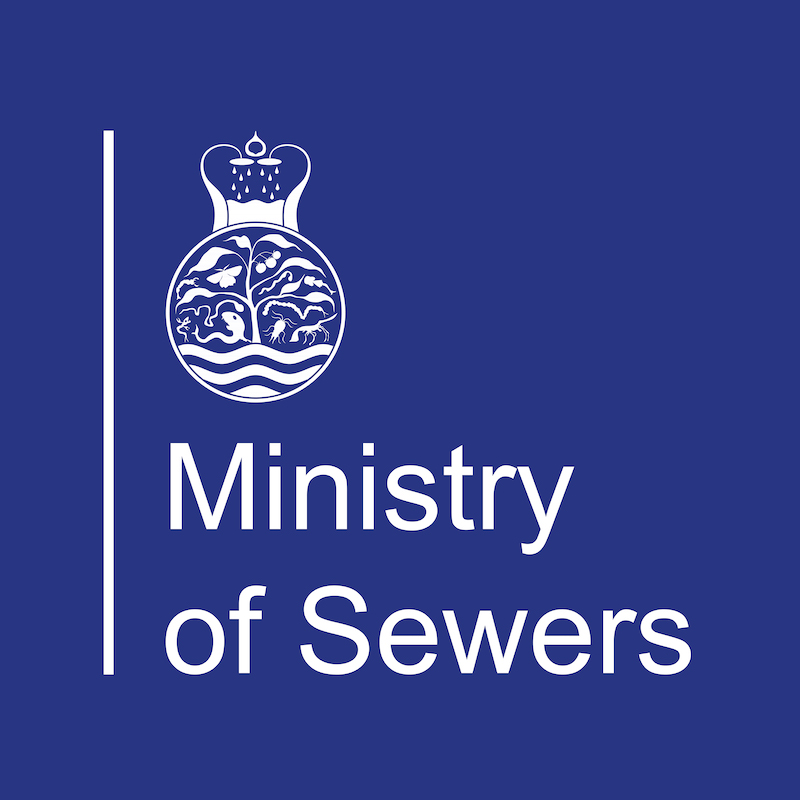
Ministry of Sewers logo on blue // Courtesy of Cooking Sections
JJS: Groups like Sewer Rage, Surfers Against Sewage, SOS Whitstable, Fish Legal, and Folkestone Sea Swimmers, along with some residents, are sending you information and data for this project. What are the main problems and who is responsible?
CS: Following a research process that lasted for more than two years, the Ministry of Sewers builds upon dozens of conversations with concerned residents, local politicians, lawyers and environmentalists who directly experience the disastrous effects of sewage runoff and mistreatment. The sale of Regional Water Authorities to limited companies in England exemplifies the long process of deregulation in the treatment of water and sewage, precipitating the current environment in which private corporations such as Thames Water are able to abuse their public responsibilities, while accumulating a debt of more than 19 billion pounds. The waterways, rivers and seas in the UK are, and should be, treated as a common asset; those who continuously abuse these resources need to be held accountable.
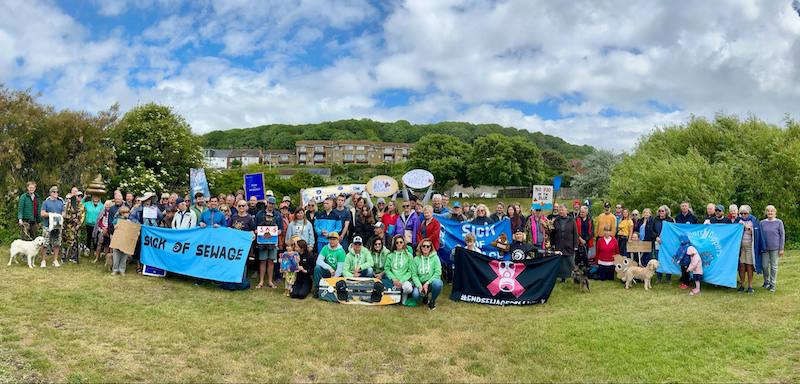
Local group photo // Courtesy of Cooking Sections
JJS: In the presentation of your project, you express your desire about uniting the voices of residents, swimmers and farmers, but their demands don’t always go hand in hand. The actions of farmers—both small and large—have a lot to do with pollution, and sometimes, swimmers are also irresponsible. Can everyone’s demands be united?
CS: The multiplicity of voices brought forward by different actors and constituents to the Ministry of Sewers is given a platform to amplify their work and concerns. The varied approaches that demand and strive to ensure that all humans and more-than-human citizens and visitors have clean water to flourish in and enjoy are what brings everyone together. The wide range of demands only strengthens the project pursuit to ensure that there is accountability and responsibility towards the public and our environment in England and beyond.

Ministry of Sewers, exterior // Courtesy of Cooking Sections
JJS: The Folkestone Triennial is an event that takes place thanks to state support (via Arts Council England). In other words, a program that aims to raise awareness about environmental damage receives funding from the same state that has been negligent with its natural environment. How do you position yourselves in this?
CS: Despite the meagre funds arts organizations receive from the UK government, the public funding that enables the work developed by artists for the Folkestone Triennial is generated from taxpayers and belongs to everyone. This is one of the many ways arts funding should be used: to push back against state negligence, to create spaces for dialogue, and to elevate the work of committed organizations and individuals striving to make a better world—in times of genocide, deteriorating public services and climate breakdown.
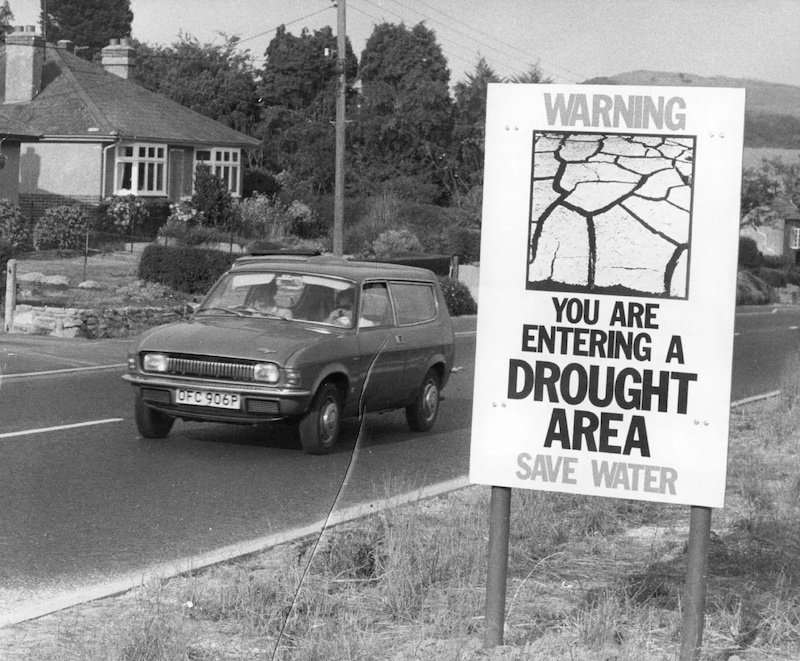
Drought Britain, 1976, archive image // Courtesy of Cooking Sections
JJS: While your plan calls for real, functional actions, the triennial is an artistic event. How will you approach the creative aspect of your participation?
CS: The Ministry of Sewers is inspired by the farcical appointment in 1976 of Dennis Howell as Minister for Drought (later Minister for Floods and Snow) in response to a series of extreme weather events. It uses this governmental precedent to argue for a different kind of civic action. The Ministry of Sewers forms a gathering place to reclaim the coastal commons. In the lead up to the opening of the Triennial, and throughout its duration, it collects archival documents, complaints and effluent memorabilia to shine a light on murky tides, health incidents, banned beach days, contaminated swims, rising water bills and broader ecological upheaval. Alongside these items, evidence and testimonies are collected throughout the Triennial into a growing Log of Grievances—a living archive of public nuisance and collective resistance.

Lord Dennis Howell, archive image // Courtesy of Cooking Sections
JJS: You’ve always been concerned about being site-responsive with your installations and performances. Are they zero-footprint? Some say the best way to achieve no environmental impact is with actions that involve neither materials nor transportation. Where do you stand in this debate?
CS: We surely agree that the drastic reduction of carbon emissions into the atmosphere is one of the most urgent tasks of our generation, and at the same time, the creation of art, like the production and the consumption of food or the travelling to work, isn’t a zero-sum game. As we have shown with our exhibition and book ‘Offsetted,’ the idea of carbon footprint emerges from the Global North’s need to continue polluting, by transferring to the Global South the responsibility to cleanse. While many of our projects, such as ‘CLIMAVORE,’ take an active role in developing food systems and materials that improve ecosystem health and cut carbon emissions, others, like the Ministry of Sewers, are focused on raising awareness in order to hold those responsible for pollution and mismanagement accountable. The transformation that is urgently needed cuts across business sectors, cultures and geographies, and all of them need to be reimagined and revolutionized.
Artist Info
Exhibition Info
Folkestone Triennial
Group Show: ‘How Lies the Land?’
Exhibition: July 19-Oct. 19, 2025
creativefolkestone.org.uk
Various Venues, Folkestone, UK, click here for map



